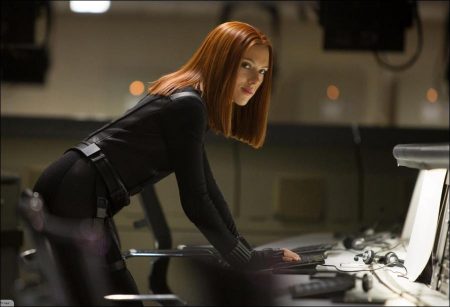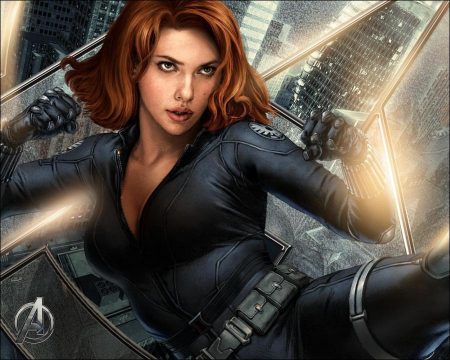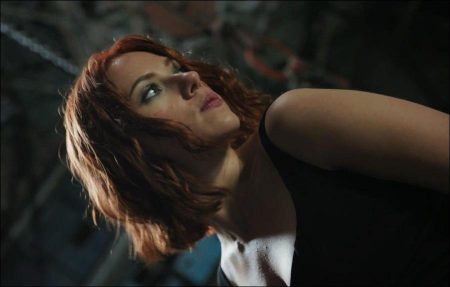Black Widow never has it easy. Onscreen, Natasha Romanov has an agonizing backstory and is working like hell to do enough good to erase the red from her moral ledger, redeeming a history of bad deeds that we are only allowed to imagine with acts of heroism that defy belief.
Offscreen, much of what Scarlett Johansson’s character does is scrutinized through the lens of gender politics. As one of the few female protagonists in the Marvel Cinematic Universe (until recently), some view her not just as an individual character but as a representative for all womankind. That’s heavy lifting even for a superhero.
Amid accusations that her story arc in Avengers: Age of Ultron was stereotyped and offensive — because, like Tony Stark, she expressed a desire to step back from saving the world (and maybe find someone in it to love, and love her back) — Black Widow became a lightning rod.
Some accused writer-director Joss Whedon of sexism for a storyline that involved Widow developing romantic feelings for Mark Ruffalo’s Bruce Banner in the comic-book version of the Beauty and the Beast folktale. Others were outraged that Widow expressed regret over the juvenile assassin program that forced her to be sterilized. Still others took offense at that complaint, saying the desire to have a family doesn’t mean a woman can’t have a career (beating the hell out of evildoers, or otherwise).
NPR’s pop culture critic Linda Holmes astutely noted that even if you swapped out Widow’s story in Ultron with the arcs of any of her male co-Avengers, each would still “raise questions of whether the story was influenced by gender stereotypes.” If she was Iron Man, she’d be the problem-causer. If she was Captain America, she’d be the uptight one. If she was Hulk, she’d have out-of-control emotions. And so on …
Add to that the scarcity of Black Widow toys, which caused universal uproar, even from Ruffalo, who tweeted about the need for Marvel merchandising to do a better job of inviting young girls to play in this universe, and Natasha Romanov starts to emerge not just as a warrior but a battlefield.
Which brings us to Captain America: Civil War. Where does Natasha’s fifth appearance in the Marvel Cinematic Universe find her?
This time, she’s on the side of order, aligning — at least for a while — with Robert Downey Jr.’s Iron Man in trying to get Captain America to honor the global Sokovia Accords that force “enhanced individuals” to operate under government control.
In one scene EW watched being filmed this summer, she and Tony Stark have a quiet moment after being given an ultimatum to bring down the rogue Cap — or else the U.S. government will do it in permanent fashion.
Stark rubs at the center of his chest, where his ARC reactor was once embedded. “You know the problem with a fully functional heart…? It’s stressful,” he tells Natasha.
Scarlett Johansson Interview
During a break in filming, we caught up with Johansson, and asked what she thinks of the tug-of-war over her character.
During a break in filming, we caught up with Johansson, and asked what she thinks of the tug-of-war over her character.
Where is Natasha’s head these days? In what state do we find her after the events of Age of Ultron?
Scarlett Johansson: My gosh, this is like a therapy session! When we last saw her I think the stakes were astronomical. And she basically had to make this choice between [duty] and what she probably deserves. I think up until this point, she has put the hours in and is ready for…
To be, or not to be, an Avenger?
[Laughs] You know, I don’t think she’s ever aspired to become an Avenger. That’s not really a choice that she made. It’s kind of like the events in her life led her to that point and when we see her [in Civil War], she’s finally capable of making a choice for herself. Which is kind of a milestone in someone’s life when they’ve not really participated in the decisions that were made for them. She’s finally at a place where she’s going, “Okay, I actually kind of know what I want. And I think I kind of deserve it.”
But she’s still in the fight. So is that what she wants?
Unfortunately the events that took place … she has this kind of greater calling and this huge pull towards doing what’s right for the greater good. And she chooses that, and it’s a really heroic thing that she does, I think.
Widow appeared to be leading the team of new Avengers we saw at the end of Ultron, gathered at their headquarters.
Yeah, I don’t know if she’s leading this team but she’s certainly, she’s — I think Natasha’s a very strategic thinker and that’s her strongpoint. Her superpowers, if you want to call them that, are her experience, her ability to make usually the right decision in a quick moment, in a tight minute. And she’s not personally invested. I mean, that’s what she tells herself anyway. And so that keeps her head kind of level and clear.
She seems to be leaning strongly toward Iron Man’s side of things.
I think when you find her in Civil War, she’s looking to strategize her position, putting herself in a place where she is able to let the powers that be fight it out or whatever amongst themselves. She’s always a little bit on the perimeter so she can have a better perspective of what’s really going on.
Visits: 236





